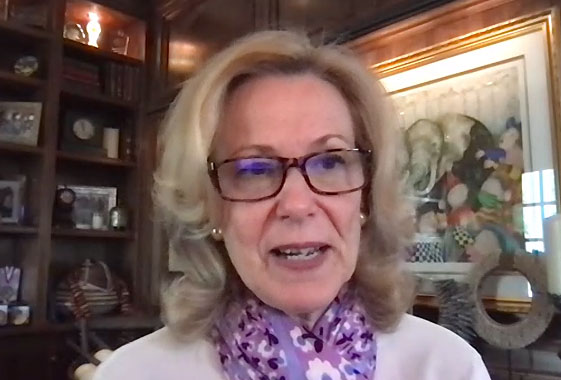Birx, Baric Headline Annual Research Festival

Presentations from a number of U.S. military researchers and scientists highlighted the U.S. Army Medical Research and Development Command's annual Spring Research Festival, held from April 28-29. The event, held in a virtual format due to the continuing global coronavirus pandemic, delved into a number of burgeoning and relevant scientific topics – most notably the ongoing pandemic itself.
"This is not a time to say, 'hey we have a vaccine and now we can relax'," said Dr. Deborah Birx, former White House Coronavirus Response Coordinator during her lengthy keynote speech on day two of the event. "This is a time when I think the military can uniquely contribute to this effort."
Indeed, much of Birx's own presentation focused on, in her words, the many ways in which the U.S. military can – and many cases already has – positively impacted the ongoing pandemic; specifically detailing the military's unique ability to provide for baseline testing across a wide variety of people and populations and, additionally, its ability to organize global manufacturing efforts. A military veteran, Birx spent 29 years in the U.S. Army – an experience which she routinely praised during her address as integral to both her personal and professional growth.
Dr. Ralph Baric, a Professor of Epidemiology at the University of North Carolina and keynote speaker for day one of the Spring Research Festival, spent much of his presentation discussing the immediate history of COVID-19 – chiefly charting its outbreak timeline and the growth of associated variants – along with burgeoning therapeutics and vaccines. Notably, he predicted the U.S. would likely experience 50 thousand more coronavirus-related deaths before the worst part of the pandemic was finished; a number coinciding with, in Baric's view, a likely final global tally of five million deaths attributable to COVID-19.
"We should be prepared to see new variants emerge over time [and] the math supports this," said Baric, encouraging vigilance while warning of the lingering impact of the virus. "Right now, the best protection of these variants of concern are the vaccines."
In addition to the keynote presentations, the Spring Research Festival featured a pair scientific poster display and judging sessions – with USAMRDC scientists comprising a substantial number of the 56 total entries – and, additionally, a separate "COVID-19 Mini Lecture Series" featuring a slew of current USAMRDC scientists as well as representatives from the National Cancer Institute and the Naval Medical Research Center and the National Biodefense Analysis and Countermeasures Centers.
During her presentation as part of the aforementioned lecture series, Leigh Anne Alexander, who serves as both the Deputy Project Manager of the Warfighter Expeditionary Medicine and Treatment Project Management Office at USAMRDC's U.S. Army Medical Materiel Development Activity and as a member of USAMMDA's Additive Manufacturing Working Group, addressed the importance of the AMWG and its ongoing efforts to streamline medical acquisition assessment processes to allow industry partners to respond to the pandemic more efficiently. The AMWG's effort, which was recently honored with the prestigious Army Medicine Wolf Pack Award, ultimately enabled USAMRDC partners to both produce and acquire a wide variety of medical products in light of supply shortages during the pandemic.
"Our goal was to temporarily alleviate supply shortages [and] working together we were able to make an impact," said Alexander, who used the production of 3-D printed nasal swabs during the height of the pandemic to illustrate the manner in which the AMWG facilitated such a widespread effort. "That is really where the everyday core mission of USAMRDC comes in – this is what MRDC does. We were just applying that skillset to a national public health emergency."
In addition to several internal USAMRDC offices and departments, other federal entities such as the National Institute of Allergy and Infectious Diseases, the U.S. Department of Agriculture, the National Biodefense Analysis and Countermeasures Centers, the Centers for Disease Control and Prevention, and the U.S. Food and Drug Administration also participated in planning and hosting the event. In securing attendance from USAMRDC educational partners and members of local county government, the 2021 USAMRDC Spring Research Festival achieved its stated goal of creating an immersive and collective educational experience.
"The Spring Research Festival is an incredible event that not only provides a unique opportunity for inter-agency engagement and collaboration, but also promotes and encourages community involvement in networking," said Taylor O'Guinn, USAMRDC STEM Program Coordinator and key member of the event's planning committee. "The Spring Research Festival gives Scientists and Engineers a platform to showcase the hard work and ground-breaking research conducted in our Fort Detrick laboratories with those that normally are not privy to the information."
 An official website of the United States government
An official website of the United States government
 ) or https:// means you've safely connected to the .mil website. Share sensitive information only on official, secure websites.
) or https:// means you've safely connected to the .mil website. Share sensitive information only on official, secure websites.


